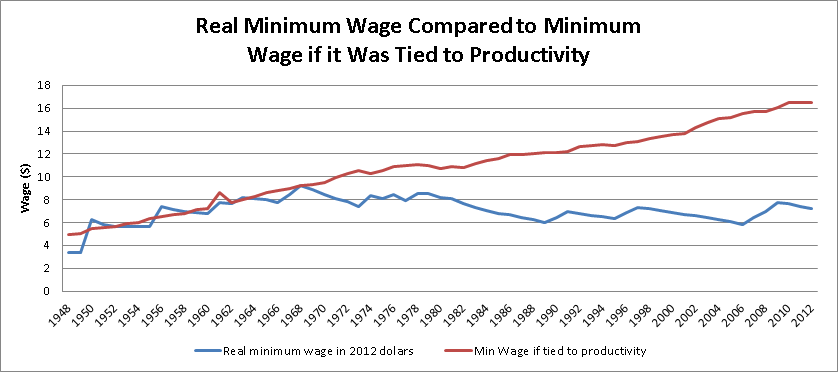February 20, 2013
The Minimum Wage Debate
In last week’s State of the Union Address, President Obama made it clear that raising our country’s federal minimum wage to $9.00 an hour was one of his top priorities. Many agree with President Obama that raising the minimum wage from the current rate of $7.25 is a necessary step to rebuilding our middle class and strengthening our economy, including members of labor unions. Take a look at this chart:

The Center for Economic and Policy Research poses this question:
“Suppose the minimum wage had kept in step with productivity growth over the last 44 years. In other words, rather than just keeping purchasing power constant at the 1969 level, suppose that our lowest paid workers shared evenly in the economic growth over the intervening years.”
As the graph displays, in the past, when minimum wage was tied to productivity, workers benefited:
“This should not seem like a far-fetched idea. In the years from 1947 to 1969 the minimum wage actually did keep pace with productivity growth. (This is probably also true for the decade from when the federal minimum wage was first established in 1937 to 1947, but we don’t have good data on productivity for this period.)
As the graph shows, the minimum wage generally was increased in step with productivity over these years. This led to 170 percent increase in the real value of the minimum wage over the years from 1948 to 1968. If this pattern of wage increases for those at the bottom was supposed to stifle growth, the economy didn’t get the message. Growth averaged 4.0 percent annually from 1947 to 1969 and the unemployment rate for the year 1969 averaged less than 4.0 percent.
This changed in the 1970’s, when the real value of minimum wage declined sharply and only kept up with inflation. This major shift in policy change happened without any public debate it would seem. The Center for Economic and Policy Research notes that if “the minimum wage had kept pace with productivity growth it would be $16.54 in 2012 dollars”.
A Business Insider piece also quotes Op-Ed columnist Ezra Klein, who notes that:
“a minimum wage is like a proxy labor union; sure it may have some employment effects, but it effectively raises the wage bargaining power of those workers who do manage to find employment. In the absence of such bargaining power, we can’t expect any meaningful increase in wages at the low end of the income spectrum.”
The article also cites a study in which found that minimum wage increases had no adverse effects on employment, and actually lead to increased employment rates among single women with children. Some date also backs the idea that reasonable wage increases affect wage hikes further up the pay scale (and also decreases the wage gap), and also provide workers with motivation to be more productive.
The fact is, raising the minimum wage would raise living standards for millions of workers who are currently living at or just above the poverty line.
As for the second argument, that $9.00 an hour still is not enough to provide a decent living for millions of working class Americans, we agree for the most part. However, not only is $9/hour a step in the right direction, it is also good for union members, who stand to seek even greater wage increases in their contracts, if they make more than the current minimum wage of $7.25.
In fact, according to the Bureau of Labor Statistics, “unionized food service employees have median weekly salaries that are $100 higher than non-union workers.”
Also, although the President is pushing for a $9 minimum wage, several state governments are pushing for $10 or more, as in Maryland.
$9 an hour is not a perfect solution. It will not raise all of America out of poverty. However, it is certainly a great stride towards providing more Americans a platform to the middle class- something that all of America should agree we need to rebuild in order to restore our economy. As President Obama noted in his SOTU address, no American working a full-time job should be living under the poverty line and nor should, if we can help it, anyone else.